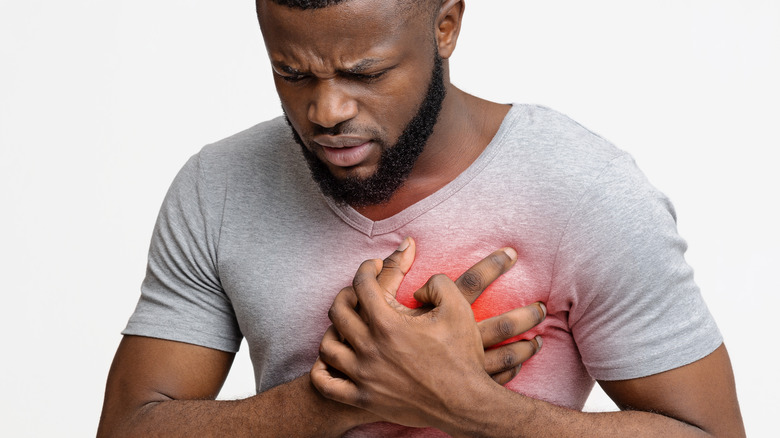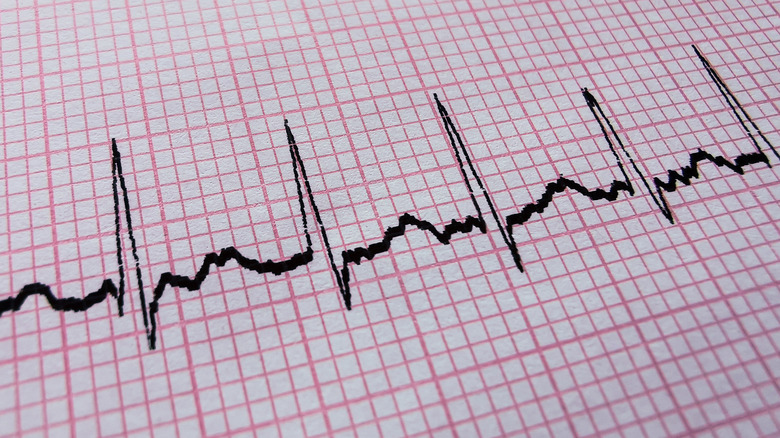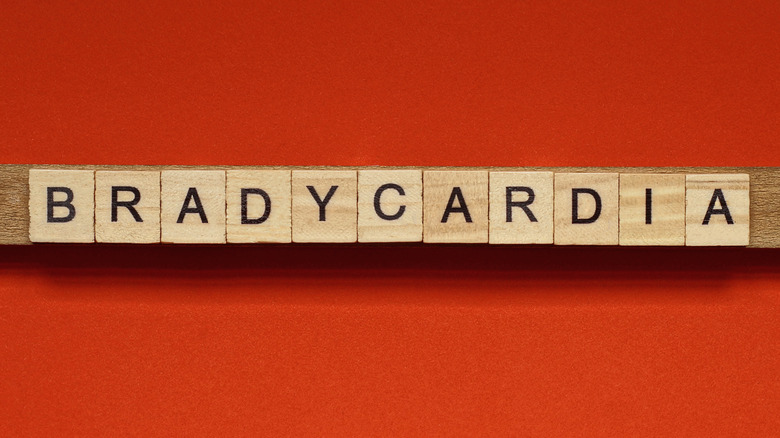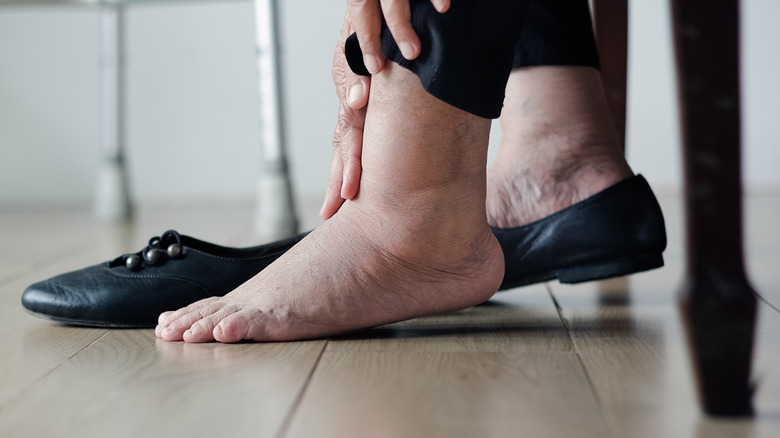Warning Signs Of Heart Disease You Should Never Ignore
We usually think of the word "disease" as being singular. In other words, a person might have one disease or multiple diseases. However, the term "heart disease" actually refers to a variety of ailments, all of which can have a negative impact on your heart (via Mayo Clinic). And if you guessed that this means they have different symptoms, you'd be ... mostly right.
Okay, let's break this down. A person can have a health issue that falls under the category of heart disease for many reasons (per Mayo Clinic). Some individuals are born with physical defects in parts of their heart. Others develop problems later in life because of things like infections and family history. However, there is one thing that all types of heart disease have in common: They are all serious conditions that should never be ignored.
That said, recognizing symptoms of heart disease can be a little tricky. As the Mayo Clinic explains, the symptoms of the different conditions categorized as heart disease can vary. Because of this, we will be covering some of the possible connections between heart-related health problems and specific symptoms. However, that doesn't mean that these symptoms can't be possible warning signs for additional ailments that fall under the umbrella of heart disease. So, if you are experiencing any of these symptoms, you should contact a health care professional to get diagnosed.
Shortness of breath
We've all had moments when we had trouble catching our breath. Maybe it happened when a beloved pet got off their leash and outran you for several blocks. Or maybe an elevator was broken, leaving you with no choice but to walk up seven flights of stairs to get to an important appointment on time. Now, imagine feeling winded while just scrambling an egg or watching TV in bed.
If you or someone you know has breathing issues for no apparent reason, then one possible cause is heart valve disease (via WebMD). As the Cleveland Clinic explains, your heart has valves that make sure blood flows correctly through your heart while it pumps. Specifically, they keep the blood flowing in one direction. But if these valves don't function the way that they should, blood can back up into the heart, potentially causing major problems. And yes, heart valve disease can be fatal, especially if it's not properly diagnosed and treated.
Although heart valve disease might require surgery, there are options for patients depending on the specifics of their case (per Cleveland Clinic). It's possible that the existing valves can be repaired. A doctor might also recommend valve replacement surgery where the damaged value is removed and replaced with an artificial valve. However, early diagnosis can be crucial for someone with heart valve disease, so never ignore its potential red flags — like occasionally having trouble catching your breath.
Enlarged fingertips
Think about what a club looks like. No, not a nightclub or what golfers use. Instead, imagine a club like you would see on "The Flintstones": a bludgeoning weapon with a top wider than its base. Now, imagine if your fingers suddenly looked like little clubs. If the shape of your fingers change like this, one of the things it could signal is heart disease (via Verywell Health).
Hypertrophic osteoarthropathy or HOA is when the tips of one's fingers become swollen. Also called "clubbing of the fingers," a person with HOA would notice that their fingernails are unnaturally sloped downward. And while the reason behind this clubbed appearance might not have anything to do with health concerns (heart or otherwise), it could also be a symptom of congestive heart failure.
Now, before you panic that your heart might suddenly stop beating, the "failure" part of congestive heart failure refers to the heart having difficulty functioning properly, rather than not functioning at all (via Johns Hopkins). Keep in mind that your heart is a muscle — and like other muscles in your body, it contracts. If your heart doesn't contract the way it's supposed to, your blood could back up inside the heart, making it congested and possibly enlarged. So, if your fingertips suddenly become swollen, see a health care professional right away.
Pain in the chest
This next symptom is arguably one of the most obvious ones when it comes to heart disease. After all, someone experiencing a heart attack will most likely feel chest pain as well. However, the two don't always go together.
As the Centers for Disease Control and Prevention (CDC) explains on their website, one possible reason why someone might be experiencing chest pain is that they could have coronary artery disease (CAD). This is when plaque accumulates inside someone's arteries — specifically, the ones responsible for circulating blood to different parts of the body, including the heart. The plaque makes the arteries narrower, which can interfere with your blood properly circulating. Now, keep in mind that you can experience a heart attack if you have CAD. In fact, it's sometimes the first warning that you have CAD. However, you might also experience a type of chest pain called angina, which is not the same thing as a heart attack.
Unsurprisingly, the amount of plaque one accumulates in their arteries can be a factor when it comes to how much chest pain they experience (via CDC). However, as the Brigham and Women's Hospital notes, men typically have buildups of plaque in the large arteries that bring blood to the heart, while women tend to have more plaque in their circulatory system's tiniest blood vessels. Regardless, plaque buildup of any kind can be dangerous, so never ignore even minor chest pain.
Fainting
Of course, there are many reasons why a person might lose consciousness, but that doesn't mean a fainting spell can't be a danger sign of bigger health concerns. According to the University of Michigan Health, passing out suddenly for a short amount of time could be a red flag that your heart is either beating too fast or too slow.
Keep in mind that there are normal reasons why a heart might slow down or speed up. For example, your pulse increases after a strenuous aerobic workout and can decrease during meditation. However, arrhythmia is a heart disease wherein your heart rate fluctuates for no apparent reason (per University of Michigan Health). This can lead to not enough blood reaching your brain and losing consciousness (formally referred to as syncope). Also, it doesn't matter if your arrhythmia is making your heartbeat too fast or too slow. Either can cause fainting spells.
Although a person with an arrhythmia usually only loses consciousness for a short amount of time, fainting spells can be life-threatening (via University of Michigan Health). For example, imagine if the person were crossing the street and collapsed without warning. Or worse, if they were behind the wheel of a vehicle and suddenly fainted. To be fair, it's possible that a fainting spell has nothing to do with one's heart rate. However, merely making assumptions about why you or someone else passed out can be dangerous. Even if someone immediately regains consciousness after fainting, seek medical help ASAP.
Fever
Did you know that your heart is enclosed in a sac inside your chest? As Medical News Today explains, our chests house a membrane called the pericardium or pericardial sac. It's made of two layers which are kept apart by fluid. And problems such as low-grade fever can start if someone develops an infection in their pericardial sac.
According to the Mayo Clinic, heart infections are a type of heart disease. And if the pericardial sac becomes infected, a person can develop a condition called pericarditis (via Medical News Today). If this occurs, then the sac's layers could become inflamed and rub together, causing pain. And since elevated body temperature can be a sign that your body is fighting off an infection, it's no wonder that a minor fever is a symptom of pericarditis.
While it can be difficult to determine why a person's pericardial sac membranes are infected, it's usually presumed that a virus might have been the source of a case of pericarditis (per Medical News Today). Two types of viruses that could be behind a pericarditis infection are adenoviruses and cytomegaloviruses. Unfortunately, those viruses can also cause myocarditis or viral heart disease and potentially interfere with your heart's normal function (via Healthline). And yes, fever is also a symptom of myocarditis. The bottom line is that even a minor fever could be alerting you to an infection that might damage your heart.
Bluish skin
If you're Nightcrawler or Mystique from the world of Marvel's X-Men, then having blue skin is not a problem. Adaptations of comic book characters aside, having blue skin on certain parts of the body may actually be a symptom of a medical condition called cyanosis (via Texas Heart Institute). And among other possible health concerns, a person might have a bluish tone to their fingers, toes, and lips if they have a congenital heart defect.
As the CDC explains, people are usually born with congenital heart defects or CHDs, which can range from a small hole in the heart to a malformed heart muscle. In some cases, CHDs can interfere with how well one's blood circulates (via Texas Heart Institute). Remember, your heart circulates not only blood that contains oxygen, but also blood that needs to be moved to the lungs to get oxygen. It accomplishes this because it's separated into different chambers. A heart defect, however, can mean that oxygen-rich and oxygen-poor blood comingle, leading to less oxygen being transported to all the parts of your body. This reduced amount of oxygen is why some people develop blue skin.
The CDC points out that some types of CHD only require one surgery to correct. Even if it's not completely repairable or curable, medical intervention could still improve the heart's function. So if a person's health care professional diagnoses that their bluish skin is connected to a heart defect, that doesn't automatically mean they have no treatment options.
Fast heartbeat
Think about the last time you really exercised hard. Maybe it was a planned aerobics class at the gym. Or maybe you were running late and had to literally run to make it on time. Whichever the case might be, chances are your heart was pounding pretty fast, which makes perfect sense. In fact, it's one of the perks of certain exercises. But now, imagine if your heart was pumping like that while you were relaxing on the couch.
As the Texas Heart Institute explains, if your heart is beating more than 100 times a minute and you can't figure out why, one of the reasons could be tachycardia. And yes, tachycardia, arrhythmia, and irregular heart rates in general fall under the umbrella of heart disease (via Mayo Clinic). In fact, there's more than one kind of tachycardia, and each type has its own unique symptoms.
For example, if your heart seems to be "skipping beats," you might have ventricular tachycardia (via Texas Heart Institute). On the other hand, if your heart is racing at as much as 250 beats a minute, then you could have supraventricular tachycardia or SVT (also called paroxysmal supraventricular tachycardia or PSVT). But these conditions do have something in common: They involve the misfiring of electrical impulses that help regulate your heartbeat. So while it's possible to monitor your heart rate at home, if you consistently have a fast heart rate, you should contact your health care professional.
Slow heartbeat
When we feel stressed and nervous, we try to calm ourselves down. And if we're successful, we usually slow down both our breathing and our heart rate. Now, this is technically not a problem, since strong emotions can speed up our hearts. But if one's heart beats too slowly for no apparent reason, that could be a warning sign of health concerns — including heart disease.
According to the Mayo Clinic, bradycardia is when an adult's heart beats slower than 60 times per minute. This can be a major problem, since an abnormally slow heart rate could mean that your heart might not be able to efficiently circulate your blood. Remember, your bloodstream is how oxygen is transported to every part of your body. Therefore, a slow heartbeat can mean that other areas of your body are not receiving what they need to function at their best.
So, is a sluggish heart rate always connected to heart disease? Not necessarily, since it could also be a symptom of other health issues like lupus or hypothyroidism (via Mayo Clinic). However, bradycardia might also be a symptom of more than one type of heart disease, including myocarditis (where the heart tissue is inflamed), injury to the heart (like the kind that can occur because of a heart attack), or defects in the heart that might have been present from the day the person was born.
Swollen ankles
It doesn't take much to twist your ankle. Just trying to walk in certain shoes can be a recipe for ankle pain and swelling. But swollen ankles and legs could be telling you that you might have a health issue, including a heart problem like a form of cardiomyopathy (via CDC).
To fully understand how cardiomyopathies affect the heart, it's important to remember that they are all diseases that impact the heart muscle itself (via Mayo Clinic). This can include the muscle becoming too thin, too thick, or too stiff (per CDC). The muscle can also become filled with substances that shouldn't be there. No matter which of these conditions is present, the result is the same: The heart muscle doesn't function normally, which can lead to issues like swollen legs and ankles.
Besides affecting one's ankles, cardiomyopathies can cause one's heartbeat to become irregular, as well as heart failure (via CDC). Although we don't fully understand why one person develops a cardiomyopathy while another one doesn't, factors like family history might play a role. Thus, if you're experiencing swollen ankles and have concerns that they might be connected to a heart problem, make sure to let a health care professional know if anyone else in your family has or had heart disease. Remember, the more information you can provide them, they more clues they have to make a thorough diagnosis.
Lumps in the fingers and/or toes
While swollen fingers can be a sign of heart disease, it's not the only possible symptom of heart-related conditions that can affect one's fingers (via Verywell Health). As Cedars-Sinai explains, bumps on the fingers and/or toes can be a sign of an infection of the heart known as bacterial endocarditis. These growths are usually either purple or red, and tend to be sore to the touch. And while they shouldn't interfere with your day-to-day activities (depending on their specific locations and how many you develop), their possible underlying cause should never be ignored.
According to Cedars-Sinai, bacterial endocarditis is a potentially life-threatening ailment that could affect your heart's valves, which are crucial for your heart to pump blood without the blood backing up into the heart. And while we normally have bacteria in areas like our digestive tract and respiratory system, if those bacteria get into the blood, they can wind up where they shouldn't be — namely, the heart.
So how can you reduce your chances of bacteria getting into your blood? One proactive step you can take is talking with a dentist or health care professional about the possible risks of a bacterial infection in connection with a specific procedure (via Cedars-Sinai). There might be precautions you can take to lower the odds of developing health problems like bacterial endocarditis. And of course, if you notice lumps on your fingers or toes, consult a medical professional immediately.
Fatigue
Do you know the difference between being tired and being fatigued? If you're tired, a nap might be all you need to recharge your batteries (via Verywell Health). But if you're fatigued, then unfortunately, no amount of rest will make you feel better. In fact, despite feeling like you want to sleep, actually falling asleep when you're fatigued might not be possible. And while there can be many causes behind this unpleasant sense of exhaustion, one of them is valvular heart disease.
According to the CDC, your heart has valves that are crucial to ensuring your blood circulates properly. These valves have leaflets, which are flaps made of tissues that help regulate the blood, so it doesn't back up into the heart while it pumps (via Cleveland Clinic). The important thing to remember here is these valves and their leaflets have a very specific design and structure. If someone has valvular heart disease, then at least one of their heart's valves is physically malformed.
While valvular heart disease can occur for a number of reasons (such as an injured valve), one of its possible causes is congenital heart valve disease (where the person has at least one valve that's somehow abnormal) or a heart abnormality in general (via CDC). For example, they might have one less valve or leaflet in their heart. A person with congenital heart valve disease can experience fatigue, making this symptom a possible warning sign of a structural issue in their heart.
Pain in your left arm
While most people automatically think of chest pain in connection to heart disease, that's not the only place one might feel discomfort. As Medical News Today explains, it's extremely common for someone to feel pain in their left arm during a heart attack. This is because certain cells in your brain manage nerve signals that are sent by both your left arm and your heart. Thus, it's possible for your brain to sense pain in both the arm and the heart during a heart attack.
In addition, a person might also feel pain in their left arm in connection to another heart disease-related health problem called angina (via Medical News Today). Now, it's important to understand that angina (which is a type of chest pain) and a heart attack are not the same thing. While both occur because the heart isn't receiving enough oxygen, a heart attack results in physical damage to the heart, while angina does not.
Besides pain in the left arm, the American Heart Association notes that a person might experience discomfort in both of their arms, as well as their stomach and neck, during a heart attack. Plus, women experiencing a heart attack tend to feel pain in their jaws and backs more often than men. Angina can also cause pain in other areas of the body like the jaw, neck, shoulders, and back (via Medical News Today). Nevertheless, if you experience pain anywhere in your body, seek medical assistance.
Nausea and vomiting
Just because you feel queasy doesn't automatically mean you have heart disease. Even if you throw up, that isn't a guarantee that something is wrong with your heart. But it's worth noting that these two unpleasant symptoms can sometimes be connected to coronary artery disease (via Cleveland Clinic).
While there are arteries throughout your circulatory system, it's the coronary arteries that help keep your heart supplied with oxygen (via Cleveland Clinic). These arteries bring blood that contains large amounts of oxygen directly to your heart. So if plaque begins to build up in them, that can interfere with your heart receiving enough oxygen to function properly. Unsurprisingly, a person with coronary artery disease can experience chest pain (angina) or even a heart attack. And this is where symptoms like nausea and vomiting can be telling.
As the Cleveland Clinic explains, a person is more likely to experience both nausea and vomiting during a heart attack. Chest pain accompanied by only nausea is more likely to be angina. Let's be crystal clear, though: Under no circumstances should you assume that your or someone else's chest pain is not a heart attack, even if you or the other person are not vomiting. There are many factors that can contribute to whether or not a person with heart disease throws up. For example, women are more likely to experience both nausea and vomiting in relationship to heart disease than men (via Healthline).
Coughing
Okay, don't get nervous because of this next symptom. Even if you're 100% healthy, you might still cough over the course of a day. In fact, the Cleveland Clinic points out that it's not common to develop coughing in connection to heart disease (via Parade). That said, you still shouldn't ignore coughing that keeps happening for no apparent reason.
According to the Cleveland Clinic, a cough that won't go away could be a sign that someone is experiencing heart failure. Contrary to its name, heart failure means the heart is not doing its job properly rather than stopping altogether (via Cleveland Clinic). For example, your heart would normally pump strong enough to draw blood away from your lungs, so oxygen can be circulated throughout your body. But if the heart is not pumping hard enough, your lungs could have fluid back up into them. This fluid is why you might be constantly coughing: It's your body's way of trying to clear your lungs, even if no amount of coughing will help.
What can bring about heart failure and possibly trigger frequent coughing? Well, there are actually several types of heart disease that can cause the heart to malfunction (via Cleveland Clinic). These include coronary artery disease where plaque builds up inside specific arteries can lead to heart failure, cardiomyopathy where the heart muscle is damaged, and heart defects.















